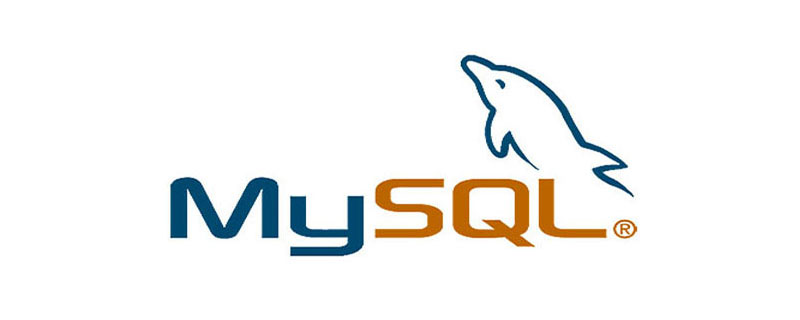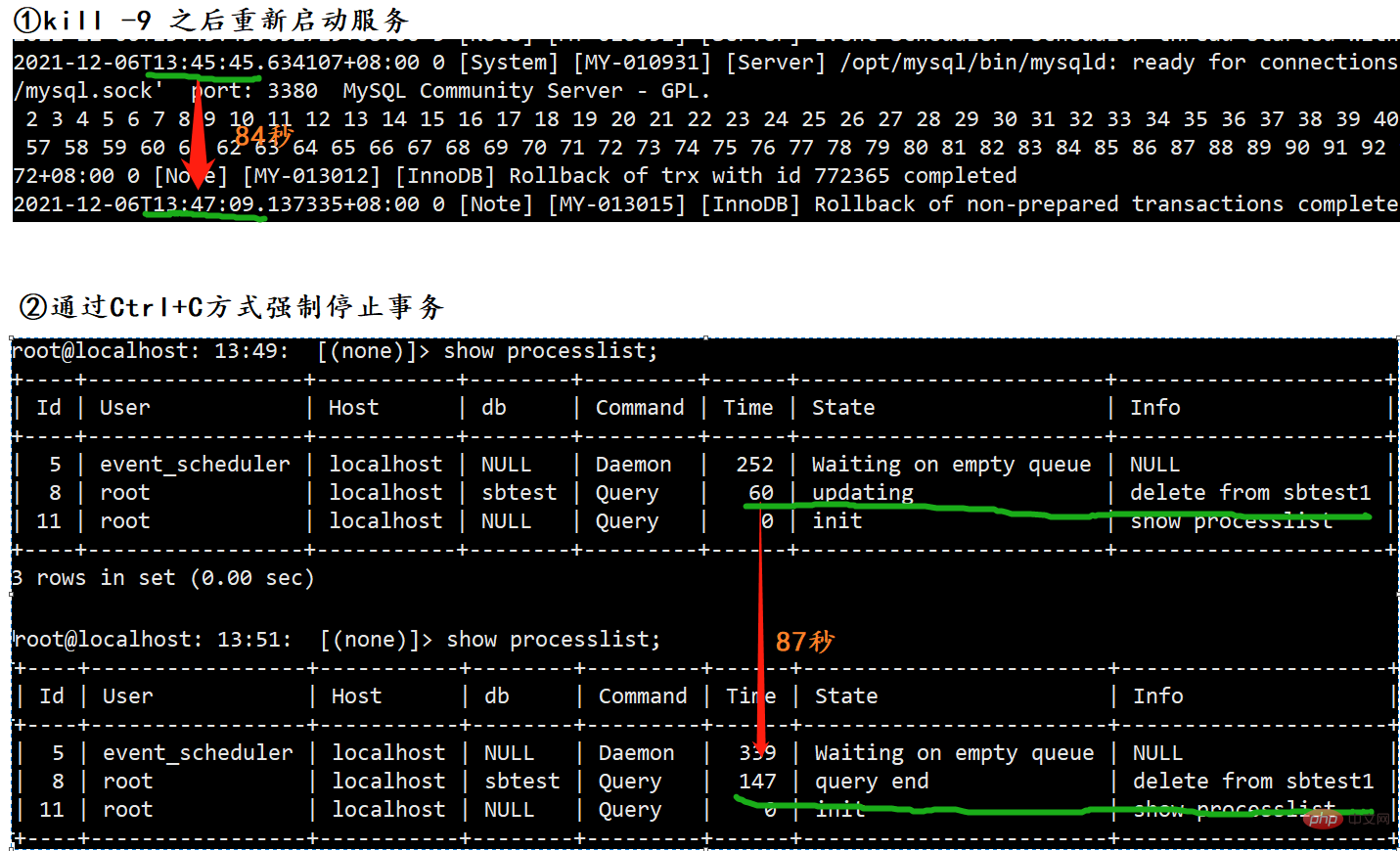MySQL rollback (summary sharing)
This article brings you relevant knowledge about mysql. It mainly organizes rollback-related issues and mainly introduces bookstore rollback and rollback mechanism. Let’s take a look at it together. ,I hope everyone has to help.

Recommended learning: mysql video tutorial
We often encounter operating a large table and find that the operation time is too long or affects the online Business needs to roll back large table operations. After stopping large table operations, waiting for rollback is a very long process. Although you may know some methods to shorten the time and are in awe of the integrity of the data in the production environment, you may choose not to intervene.
Transaction rollback
A transaction is an execution unit in a relational database and can be submitted or rolled back through the final stage control. Perform rollback operations in various scenarios where integrity cannot be guaranteed. Rollback in MySQL is accomplished through the Undo log, which contains information about how to undo the latest changes related to the transaction. Undo logs exist in the Undo log segment, and the Undo log segment is included in the rollback segment. The rollback segment is located in the undo table space and the global Temporary table space.
The relationship is as follows:

- undo file

mysql > show variables like '%undo%'; +--------------------------+--------------------+ | Variable_name | Value | +--------------------------+--------------------+ | innodb_max_undo_log_size | 1073741824 | | innodb_undo_directory | /opt/data8.0/mysql | | innodb_undo_log_encrypt | OFF | | innodb_undo_log_truncate | ON | | innodb_undo_tablespaces | 2 | +--------------------------+--------------------+ 5 rows in set (0.00 sec)
refers to the global Temporary A temporary tablespace (ibtmp1) that stores rollback segments for changes to user-created temporary tables.

mysql > SELECT @@innodb_temp_data_file_path; +-------------------------------+ | @@innodb_temp_data_file_path | +-------------------------------+ | ibtmp1:128M:autoextend:max:30G | +-------------------------------+
After understanding the files included in the rollback, continue reading.
Rollback mechanism:
MySQL rollback control is coordinated by the internal innodb engine and does not provide a human-controlled mechanism. The MySQL rollback parameters currently provided are as follows:
mysql> SHOW VARIABLES LIKE '%ROLL%'; +----------------------------+-------+ | Variable_name | Value | +----------------------------+-------+ | innodb_rollback_on_timeout | OFF | | innodb_rollback_segments | 128 | +----------------------------+-------+
innodb_rollback_on_timeout:
By default, InnoDB only rolls back the last statement when the transaction times out. If --InnoDB -rollback-on-timeout is specified, a transaction timeout will cause InnoDB to abort and roll back the entire transaction. It is turned off by default, once the specified time, such as rollback fails. It is conceivable that there will be inconsistencies in the data. This method is not advisable.
Innodb_rollback_segments (1~128):
Defines the number of rollback segments allocated to each undo table space, and the number of global temporary table spaces allocated for transactions that generate undo records .
The number of transactions supported by the rollback segment: depends on the number of undo slots in the rollback segment and the number of undo logs required for each transaction
The number of undo slots in the officially provided rollback segment is based on InnoDB Page size related:

From the latest MySQL8.0.27 source code implementation storage\innobase\include\trx0rseg.h:
/* Number of undo log slots in a rollback segment file copy 这里 UNIV_PAGE_SIZE正常页面的大小 即 1024*/ #define TRX_RSEG_N_SLOTS (UNIV_PAGE_SIZE / 16) /* Maximum number of transactions supported by a single rollback segment 单个回滚段支持的最大事务数1024/2=512 */ #define TRX_RSEG_MAX_N_TRXS (TRX_RSEG_N_SLOTS / 2)
By default page 1024 slots (TRX_RSEG_N_SLOTS) are divided into it, and each slot corresponds to an undo log object. Therefore, theoretically InnoDB can support 128 * 512 = 65536 ordinary transactions.
For the principle part, please refer to MySQL · Engine Features · InnoDB undo log roaming
Officially provides undbo rollback concurrent read and write scenarios:

Return from the principle of appeal In actual application scenarios:
The ability to support rollback segments is still considerable, but it is often very slow when executing large batches of rollbacks. Especially during online processing, it may take 10 minutes to roll back 100,000 rows. Or even longer.
The following uses sysbench to prepare 50 million single table data. Under no load, delete it for about 1 minute, and then use kill -9 to force stop the transaction to roll back the transaction:

Obviously the effect of restarting is better.
However, the kill -9 method can easily damage the data page, and there is a great risk. The database is also under load in daily life. It can be imagined that the cost of rolling back large transactions is very high.
Summary
Large rollback operations should be avoided as much as possible, which consumes database resources and performance, and can lead to major production accidents in a production environment. If large transaction rollback cannot be avoided, you can take the following methods:
- For batch operations, you can submit them in batches. For example, the
- undo space and global temporary table space of 1,000 to 5,000 rows can be adjusted appropriately. It is recommended to use 4 undo files and initialize 1G global ibtmp1. In a high-availability environment and ensure data consistency, you can promote the slave to a new master, provide services, and wait for large transactions to be rolled back.
- In extreme cases, you can use kill -9 to restart the operation. Because the amount of data is very large, mysql recovery will be slow. At this time, you need to wait for mysql to perform crash recovery. The waiting time will be different depending on the amount of data.
- If the data page is damaged or the rollback is skipped during the restart process, you can pass innodb_force_recovery=3 (no transaction rollback operation is performed.)
- Recommended learning:
The above is the detailed content of MySQL rollback (summary sharing). For more information, please follow other related articles on the PHP Chinese website!

Hot AI Tools

Undresser.AI Undress
AI-powered app for creating realistic nude photos

AI Clothes Remover
Online AI tool for removing clothes from photos.

Undress AI Tool
Undress images for free

Clothoff.io
AI clothes remover

Video Face Swap
Swap faces in any video effortlessly with our completely free AI face swap tool!

Hot Article

Hot Tools

Notepad++7.3.1
Easy-to-use and free code editor

SublimeText3 Chinese version
Chinese version, very easy to use

Zend Studio 13.0.1
Powerful PHP integrated development environment

Dreamweaver CS6
Visual web development tools

SublimeText3 Mac version
God-level code editing software (SublimeText3)

Hot Topics
 1670
1670
 14
14
 1428
1428
 52
52
 1329
1329
 25
25
 1274
1274
 29
29
 1256
1256
 24
24
 Laravel Introduction Example
Apr 18, 2025 pm 12:45 PM
Laravel Introduction Example
Apr 18, 2025 pm 12:45 PM
Laravel is a PHP framework for easy building of web applications. It provides a range of powerful features including: Installation: Install the Laravel CLI globally with Composer and create applications in the project directory. Routing: Define the relationship between the URL and the handler in routes/web.php. View: Create a view in resources/views to render the application's interface. Database Integration: Provides out-of-the-box integration with databases such as MySQL and uses migration to create and modify tables. Model and Controller: The model represents the database entity and the controller processes HTTP requests.
 MySQL and phpMyAdmin: Core Features and Functions
Apr 22, 2025 am 12:12 AM
MySQL and phpMyAdmin: Core Features and Functions
Apr 22, 2025 am 12:12 AM
MySQL and phpMyAdmin are powerful database management tools. 1) MySQL is used to create databases and tables, and to execute DML and SQL queries. 2) phpMyAdmin provides an intuitive interface for database management, table structure management, data operations and user permission management.
 MySQL vs. Other Programming Languages: A Comparison
Apr 19, 2025 am 12:22 AM
MySQL vs. Other Programming Languages: A Comparison
Apr 19, 2025 am 12:22 AM
Compared with other programming languages, MySQL is mainly used to store and manage data, while other languages such as Python, Java, and C are used for logical processing and application development. MySQL is known for its high performance, scalability and cross-platform support, suitable for data management needs, while other languages have advantages in their respective fields such as data analytics, enterprise applications, and system programming.
 Laravel framework installation method
Apr 18, 2025 pm 12:54 PM
Laravel framework installation method
Apr 18, 2025 pm 12:54 PM
Article summary: This article provides detailed step-by-step instructions to guide readers on how to easily install the Laravel framework. Laravel is a powerful PHP framework that speeds up the development process of web applications. This tutorial covers the installation process from system requirements to configuring databases and setting up routing. By following these steps, readers can quickly and efficiently lay a solid foundation for their Laravel project.
 Explain the purpose of foreign keys in MySQL.
Apr 25, 2025 am 12:17 AM
Explain the purpose of foreign keys in MySQL.
Apr 25, 2025 am 12:17 AM
In MySQL, the function of foreign keys is to establish the relationship between tables and ensure the consistency and integrity of the data. Foreign keys maintain the effectiveness of data through reference integrity checks and cascading operations. Pay attention to performance optimization and avoid common errors when using them.
 Compare and contrast MySQL and MariaDB.
Apr 26, 2025 am 12:08 AM
Compare and contrast MySQL and MariaDB.
Apr 26, 2025 am 12:08 AM
The main difference between MySQL and MariaDB is performance, functionality and license: 1. MySQL is developed by Oracle, and MariaDB is its fork. 2. MariaDB may perform better in high load environments. 3.MariaDB provides more storage engines and functions. 4.MySQL adopts a dual license, and MariaDB is completely open source. The existing infrastructure, performance requirements, functional requirements and license costs should be taken into account when choosing.
 What software is better for yi framework? Recommended software for yi framework
Apr 18, 2025 pm 11:03 PM
What software is better for yi framework? Recommended software for yi framework
Apr 18, 2025 pm 11:03 PM
Abstract of the first paragraph of the article: When choosing software to develop Yi framework applications, multiple factors need to be considered. While native mobile application development tools such as XCode and Android Studio can provide strong control and flexibility, cross-platform frameworks such as React Native and Flutter are becoming increasingly popular with the benefits of being able to deploy to multiple platforms at once. For developers new to mobile development, low-code or no-code platforms such as AppSheet and Glide can quickly and easily build applications. Additionally, cloud service providers such as AWS Amplify and Firebase provide comprehensive tools
 SQL vs. MySQL: Clarifying the Relationship Between the Two
Apr 24, 2025 am 12:02 AM
SQL vs. MySQL: Clarifying the Relationship Between the Two
Apr 24, 2025 am 12:02 AM
SQL is a standard language for managing relational databases, while MySQL is a database management system that uses SQL. SQL defines ways to interact with a database, including CRUD operations, while MySQL implements the SQL standard and provides additional features such as stored procedures and triggers.





